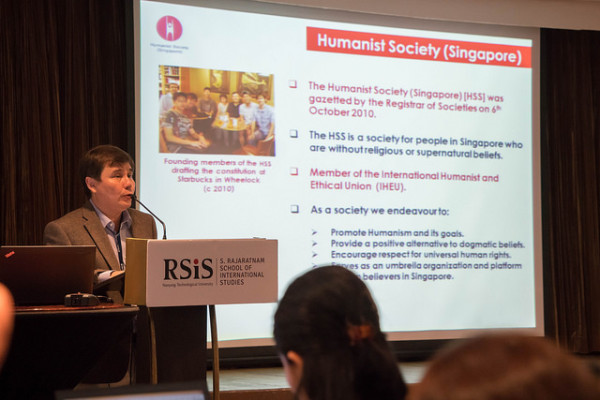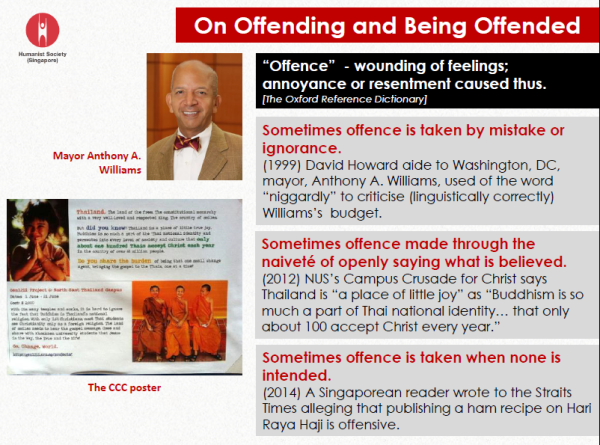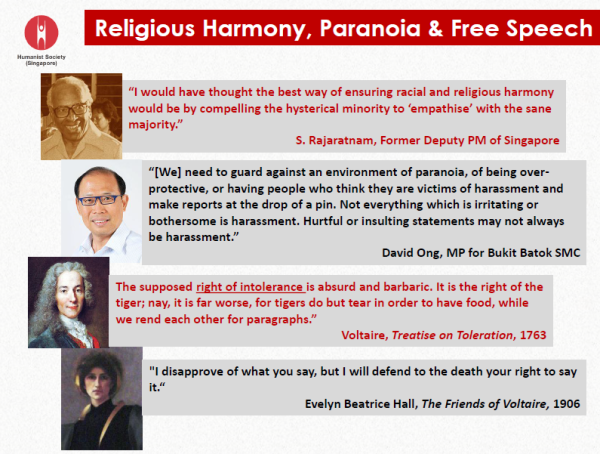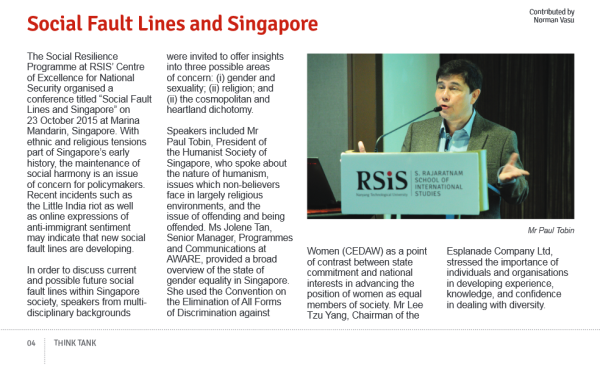This is a summary of the lecture on humanism and offence delivered by HSS President Paul Tobin at a CENS workshop on October 23, 2015. It was followed by a QnA.
If an earthquake causes a building’s roof to collapse, should engineers fix the roof and pretend geological fault lines do not exist? Or should engineers acknowledge these inevitable fault lines and build stronger buildings to withstand future quakes?
HSS President Paul Tobin made this analogy when discussing religious fault lines in Singapore on October 23 at a one-day workshop titled “Social Fault Lines and Singapore” at Marina Mandarin Singapore, which saw 7 other speakers discussing issues such as religion, social class, gender and sexuality as social faultlines threatening Singapore’s cohesiveness.
In his 30-minute presentation to a packed room comprising government officials, academics and civil society activists, Paul said the society should take reference to how engineers deal with earthquakes. Instead of blaming the falling roof, engineers build stronger buildings to withstand future shocks. Similarly, the society-at-large should accept the inevitably of religious fault lines and build thicker skins to withstand offense, instead of pinning all blame on the offender who could just be simply expressing his honest thoughts.
This is important as taking offense is unavoidable in multireligious and multicultural Singapore due to fundamental differences between different beliefs, argued Paul. Forcing people of different beliefs to respect each other’s ideas would make them hypocrites. Protecting offended feelings also runs the risk of “deliberate offence taking”, where the intolerant exploit de jure and de facto blasphemy laws to shut off legitimate criticism and marginalise minorities, he added.
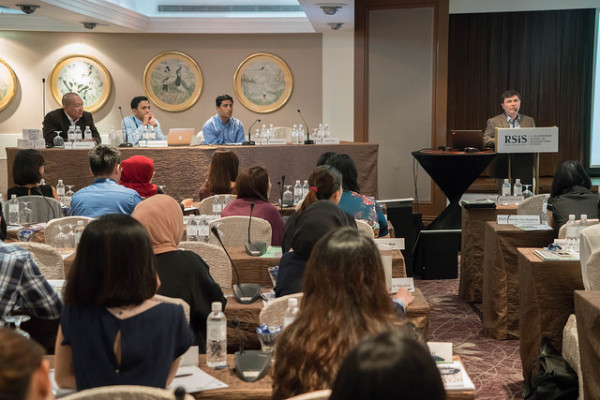
Paul’s presentation, titled “Offense, Blasphemy and Humanism in Singapore” was part of a workshop organised by the Centre of Excellence for National Security (CENS) which is part of NTU’s S. Rajaratnam School of International Studies, and supported by the National Security Coordination Secretariat (NSCS) which is part of the Singapore Prime Minister’s Office. It is the first time the HSS is attending such a high level conference and the executive committee had put in special effort to produce a decent presentation.
Paul’s presentation was the first lecture of the day, as part of a panel consisting of IPS Senior Research Fellow Mathew Mathews and MUIS Deputy Director Nazirudin Mohd Nasiri. After taking the floor, Paul started off by introducing humanism as a lifestance which embraces a morality centered on human welfare that takes a rational approach to problems.
He then mentioned famed humanists such as Carl Sagan and Steven Weinberg, and local humanists such as Catherine Lim and Alex Au. He also briefly described the history of humanism, which traces its broad origins to thinkers such as Roman philosopher Cicero, Greek thinker Epicurus, Tamil sage Thiruvalluvar and Chinese scholar Mencius. He then described the humanist society’s origins, events and interfaith efforts to the audience.
NON-RELIGIOUS VIEWS AND BLASPHEMY
Humanists often end up on the ‘offending’ side of history, said Paul, citing religious verses which reflect hostile attitudes towards the non-believing aspect of humanism. For example, Psalms 14:1 described people who do not believe in God as fools and doers of vile deeds. Non-believers such as Dijad ibn Dirham, a materialist who denied the resurrection of the dead , was executed in Iraq in 742 A.D for doubting religion. While things are better for non-believers today with more than 120 humanists, atheist, freethought and rationalism organisations in over 40 countries, some hostility still exists.
For example, Saudi Arabia’s new anti-terrorism law considers anyone who “calls for atheist thought in any form” a terrorist. Malaysian Prime Minister Najib Razak in 2014 described humanism, secularism and liberalism as “deviant” and “a threat to Islam” and the state. In addition, there are de jure blasphemy laws such as death for apostasy in 12 countries, and de facto blasphemy laws in 55 countries in the form of laws against “offending religious feelings”. In 6 of these 55 countries, offending religious feelings is punishable by death. Paul then highlighted mob violence against non-believers. For example, five atheist and secularist bloggers in Bangladesh have been hacked to death recently.
Paul then describes different types of offence:
He then asks these three questions:
Paul then describes the problem that arises from the “victimhood” of the offended. As a result of the upper hand gained by the “offended” through sympathy and fear from outsiders, people could resort to deliberate offence-taking as a tool to shut down discussion of criticism and pin labels such as “racist, bigot, anti-semitic, homophobic and islamophobic” on people they disagree with, even when it is unjustified. Paul warned that such deliberate offence-taking is a method of imposing one’s views or religious practices on others.
HANDLING OFFENSE
Paul asks if we should always be “taken hostage” by the offender. Why hostage? Paul argues that:
- If the feeling of offence is due to ignorance, then it only perpetuates ignorance.
- If the feeling of offence is due to a sense of entitlement for one’s culture/religion, others have to indirectly submit to the culture/religion they did not sign up for.
- If the feeling of offence is deliberate, then we are letting the offended party suppress legitimate criticism of issues.
- If the the feeling of offence comes from a very tiny intolerant minority, then we are sinking the level of tolerance to the lowest common denominator.
Paul then raised some local flare ups to demonstrate why taking offense cannot be avoided in a multireligious, multicultural society in Singapore. For example, Buddhists were offended by Christian criticism of their religion, such as Pastor Rony Tan’s ridiculing of rebirth, karma and nirvana, and a poster by NUS Campus Crusade for Christ which says the Thailand as a Buddhist-majority country is a place with little true joy. Just like geological fault lines causing earthquakes, these flare ups will be hard to prevent because there are fundamental unbridgeable differences in beliefs between these two religions. The better way forward is to build the capacity for society to withstand these offenses.
Wrapping up his presentation, Paul gave three proposals:
1) Develop thicker skins
Paul said that people need to realise that offence cannot be avoided and there is no fundamental human right to be protected from being offended. Paul suggested that more awareness be raised about the need to avoid making mountains out of molehills.
2) Not to tolerate the intolerant who want violent retaliation against those who offend them
Paul argued that there is NO moral equivalence between murder / physical harm and offensive words or pictures.
3) “Respect each other’s right to belief” than “Respect each other’s belief”
Paul explained that people all have beliefs that contradict and offend each other. Respecting beliefs will result in hypocrisy while respecting the right to belief accepts the reality of a multi-religious society and develops tolerance for beliefs even if they contain elements abhorrent to others.
Paul ended with presentation with quotes from well-known figures:
The presentation was followed by a QnA. Picture below: Paul (second from left) and HSS members posing for a photo with workshop organisers from RSIS:
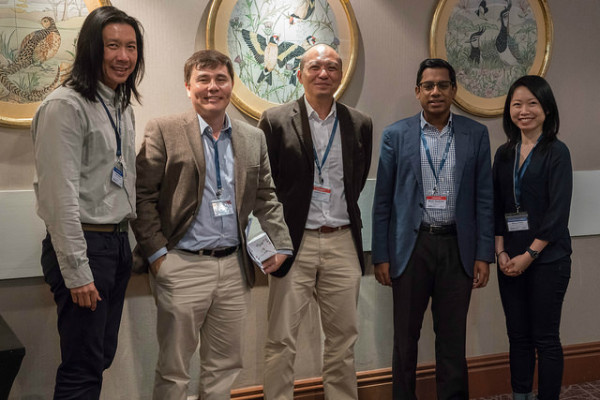
Paul’s presentation was mentioned in the RSIS newsletter Think Tank, Issue 35, January 2016.




